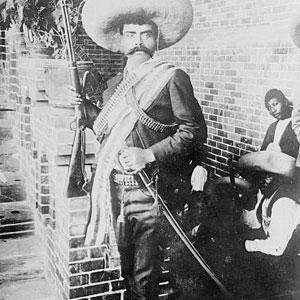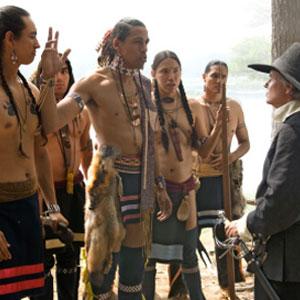This month, EDSITEment celebrates the Mexican Revolution Centennial and Native American History Month. It also offers Civil War lesson plans in recognition of the 150th anniversary of the Civil War and, in time for Thanksgiving, a resource for Plymouth Colonial history and archeology.

Centennial of the Mexican Revolution
This month we shine our spotlight on Mexico, our neighbor to the south. The Mexican Revolution took place between 1910 and 1920, and is recognized as the first major political, social, and cultural revolution of the twentieth century. This was an armed uprising of the Mexican people against the corrupt dictatorship in power. Over that decade, the Revolution erupted into a full-blown civil war that caused tremendous upheaval in the country. Celebrated on November 20, it is one of two important anniversaries for Mexico in 2010—the other being the bicentennial of Mexican Independence, which celebrated events leading up to Mexico’s from Spanish colonial rule on September 16, 1810. The United States was significantly affected by the human dislocation that resulted: if someone did not want to fight, the only alternative was to leave the country—and more than 890,000 Mexicans did just that by legally emigrating north during the second decade of the twentieth century. Check back later this month for a Spanish-language version of our Centennial page.
The legacy left by this seminal event is one of music as well as human migration. The tradition of the corridos of the Mexican Revolution can be traced back to medieval Europe’s mester de juglaría (ministry of the troubadours). The corridos— recording events in songs—are stories told in poetic form and sung to simple music, much like English ballads, and using colloquial language. Although the corridos grew in popularity in Mexico during the 1800s, the Mexican Revolution gave birth to a large number of them that narrated a variety of events, from important battles or celebrated great leaders or fighters of the Revolution. The Mexican Revolution took place in a predominantly illiterate nation with a dismantled infrastructure. Therefore, the corridos became a way to record, celebrate, or mourn events, places, or people during the Revolution, very much like a newspaper put to music. The corrido tradition documents aspects of Mexico’s culture and identity on a wide variety of subjects. Listen to corridos, and see the lyrics (bilingual), while singer Antonio Aguilar performs, accompanied by mariachis.
Native American History Month

This Thanksgiving students can see how one tribe of Native Americans, the Wampanoags, interacted with the Pilgrims along with other untold Native American stories in the reprise of We Shall Remain, an NEH-funded five-part series on PBS.
This series spans four centuries and shows Native Americans’ history as part of the national experience, from the Mayflower to the Wounded Knee occupation of 1973. Not only is each episode viewable online, but each is accompanied by a full transcript and teacher’s guide. In what follows, we suggest pairing the first three episodes with one or more related EDSITEment lessons or reviewed websites in order to help teachers’ incorporate these stories into the U.S. history course.
You can also take advantage of the resources of the National Museum of the American Indian and the new EDSITEment-reviewed website Native American Histories from the University of Washington Library as well as the NEH-funded websites Cracking the Maya Code and The Fiery Pool: The Maya and the Mythic Sea.
Civil War Anniversary
Discover what EDSITEment has ready for the 150th anniversary of the American Civil War: more than thirty-three lessons on the causes, the course, and the consequences of the war.
Veterans Day
This Veterans Day, contemplate how Civil War soldiers returned to peace after years of fighting. In Homer’s Civil War Veteran: Battlefield to Wheat Field, students consider Civil War veterans’ memories and emotions as they returned to civilian jobs.
Thanksgiving
Not new, but an excellent source of information on Plymouth Colonial history and archeology, or for anyone looking to reference the authentic history of Thanksgiving, visit the EDSITEment-vetted website The Plymouth Colony Archive Project with useful links.
About EDSITEment
Now in its eleventh year, EDSITEment is a partnership among the National Endowment for the Humanities and the National Trust for the Humanities. This free-access, user-friendly website showcases more than 300 top humanities sites that have been identified and reviewed for content, design, and educational impact in fields such as social studies, history, literature, foreign languages, art, and culture. EDSITEment also creates grade-specific lesson plans that incorporate online resources, original source materials, and interactive learning activities, games, and quizzes for use by K–12 teachers and students. Find out why the American Association of School Librarians selected EDSITEment as one the 25 Top Website for Teaching and Learning for 2010.



